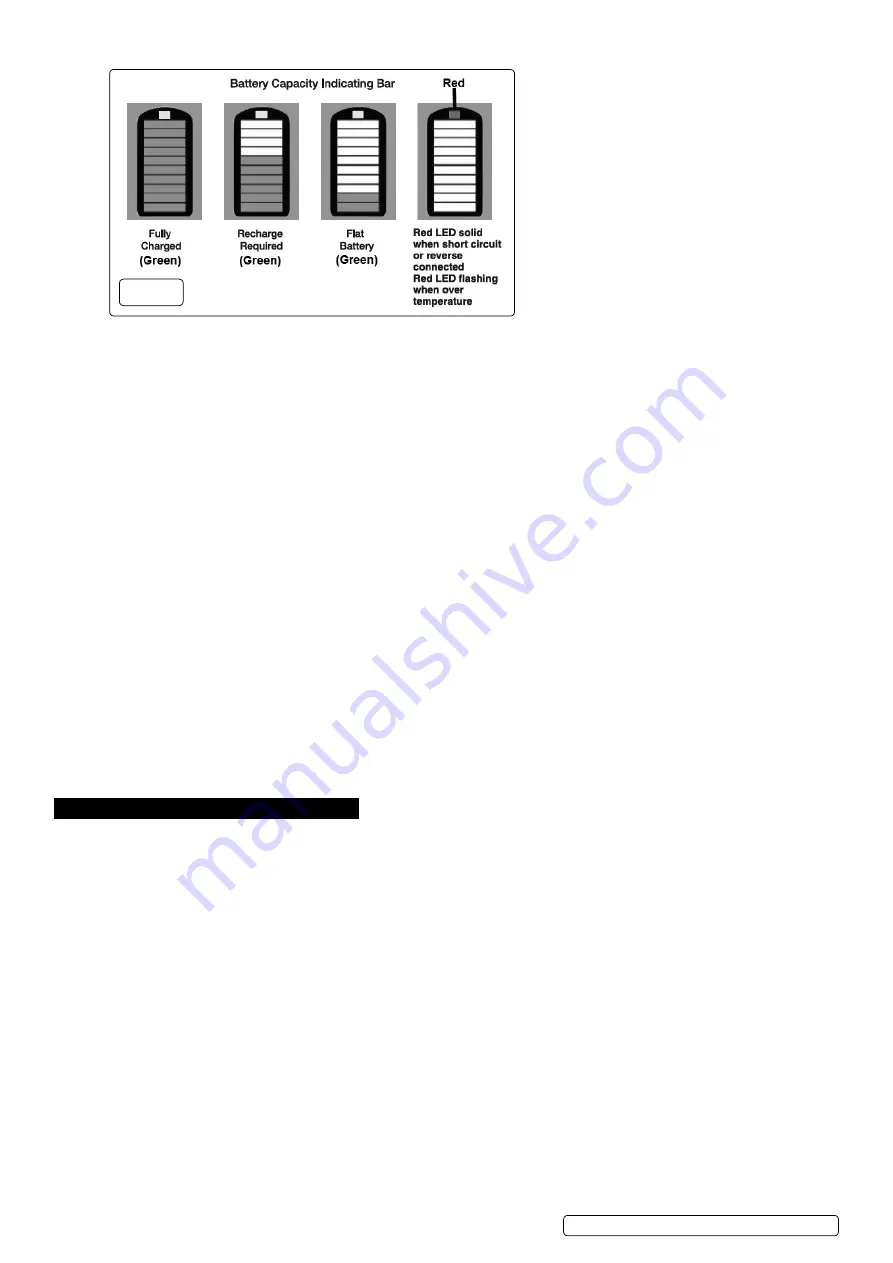
4.3.
BatteRy capacity indicating BaR
4.4.
opeRation as a poRtaBle poWeR supply
4.4.1.
usB type a socKet:
This Roadstart is fitted with a 5V USB output on the rear of the unit. Plug in your USB cable to the socket, connect to your device and
switch the USB On/Off switch, fig.2, to the On position. The USB socket is fitted with an overload circuit; if the socket is overloaded
power will be switched off and will automatically reset after 2 minutes.
4.4.2.
12V poWeR socKets:
This unit is fitted with 2 x 12V power sockets. Plug in your device and power will be available as soon as a connection is made,
whether the power switch is in the On or Off position. These sockets combined are rated at 15 Amps. Please do not exceed
these rated limits to prevent overloading the internal circuitry. ensure the rubber dust covers are placed over the sockets when not in
use to prevent dust or moisture from entering the socket.
4.5.
led WoRKlight
depress the worklight switch once to turn the light on. depress the switch again to turn the light off.
4.6.
RechaRging the RoadstaRt unit
4.6.1.
For maximum battery life it is recommended that this unit be kept fully charged at all times. Use only the supplied charger, as it is
automatic and does not require monitoring of the charging process. Failure to do so could damage the unit, and will invalidate the
warranty.
Plug the charger into the mains socket and insert the round charging plug into the charge socket. The charger will display a
red led while charging and should be left connected until the Roadstart led display indicates full.
4.6.2.
If it is not practicable to leave the Roadstart on charge full time, recharge the unit every 3 months even if it isn’t used.
4.6.3.
Recharge the unit as soon as possible if the low voltage warning activates.
4.6.4.
Avoid storage in extreme temperatures where possible (above 50° C and below freezing).
4.6.5.
never store the unit in a discharged state.
4.6.6.
low internal Battery Voltage alarm -
This unit is fitted with an alarm
to indicate that the Roadstart battery has reduced to less than
60%. There is a beep together with a flash of the red LED, see fig.3, at 25 second intervals, whilst the On/Off switch is set to On.
4.7.
BatteRy disposal:
The lead acid battery contained in this Roadstart should be recycled once expired (consult your local authority requirements for safe
disposal of lead acid batteries).
To remove the battery, remove the screws surrounding the back housing then remove the rear panel to expose the battery cavity.
Unscrew the two hex head screws on the battery terminals and then gently slide the battery out of its cavity. once the battery is out,
insulate the battery terminals with strips of electrical tape to prevent accidental short circuits.
5. inBuilt safety systems
5.1.
This Roadstart is fitted with sophisticated electronic safety systems to protect the unit and the connected battery in the result of
accidental user error. Even with these protection systems in place, extreme care should be taken with the correct identification of the
system voltage and the batteries being jump started.
5.1.1.
short circuit protection:
In the event of accidentally touching the positive and negative clamps together while switched on, the unit
will shut off output power thereby preventing a dangerous overload situation. A small spark may still emit from the clamps, care should
still be taken to not short circuit the unit around lead acid batteries.
5.1.2.
Reverse polarity protection:
If the unit is accidentally connected in the reverse polarity when switched on, the red led on the front
panel will illuminate along with a continuous warning tone (beep). Power will not output during reverse connection. Switch off the
main switch and correct the polarity of the connection.
The Roadstart will only detect a reverse polarity connection when the main switch is on.
5.1.3.
24V battery connection protection:
In the event of accidental connection to a 24V battery system, the Roadstart unit will
automatically enable its overload protection and switch power output off. The red LED, see fig.3, will illuminate on at the front panel,
along with the warning tone. even though this protection will protect the Roadstart from catastrophic failure, extreme care should be
taken by the user to correctly identify the type of battery to be jump started and the operating voltage of the system.
5.1.4.
over load and over temperature protection:
When in use as a Roadstart, if load is too big or unit is under load for too long, the red
led on front panel will flash, see fig.3, also the Roadstart will stop output. After a period of resting time it will automatically start again.
fig.3
Original Language Version
© Jack Sealey limited
RS1B, RS102B, RS103B | Issue 2(4) 08/07/19






















